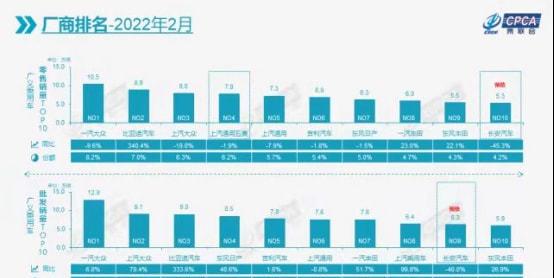In February 2022, the domestic retail sales of passenger cars were 1.246 million units, an increase of 4.2% year-on-year, of which the retail sales of new energy passenger cars were 272,000 units, an increase of 180.5% year-on-year, and the automobile market showed a warming trend.

According to the february manufacturers' retail sales list, FAW-Volkswagen, BYD and SAIC Volkswagen ranked in the top three of the list, of which BYD ranked second in the list, surpassing Geely and Changan to become the first, and it was still the car that boosted BYD's continuous strength.
Affected by the Spring Festival holiday and chip shortage, Qin PLUS DM-i sales in February reached 14228 vehicles, plus 8264 Qin PLUS EV, the total sales of the Qin PLUS family in February has exceeded 20,000, to know that in February, bicycle sales exceeded 20,000, only Nissan Xuanyi, Volkswagen Langyi and Hongguang MINIEV three models, monthly sales of more than 10,000 models only 14 models.
Not only that, bydir Han EV sales in February also reached 8935 vehicles, jumping 18 places in one fell swoop, and Dolphin also made a report card of 8561 vehicles, jumping 12 places, so you know how much BYD has to play whether it is hybrid or pure electricity.
In addition to BYD's eye-catching performance, there are Hongguang MINIEV and Geely Emgrand, the rest of the rankings are mainly German and Japanese models, the top two on the list are still familiar Nissan Xuanyi, Volkswagen Langyi, respectively, sold 28519 and 26707 vehicles.
Japanese brands performed better in February, corolla returned to the top of the car sales list with a performance of 15365 units, jumping 28 places in one fell swoop, in addition, the sales of the traditional Japanese B-class top three Asian Dragons in February were also outstanding, reaching 11236 units, up 62.4% month-on-month, jumping 38 places, compared with the Camry's 14228 vehicles, Honda Accord's 13816 vehicles and Tianlai 10268 vehicles, the performance is more eye-catching.
At the same time, sports cars such as Civic and Honda Fit have also climbed slightly, reaching 8833 and 7281 respectively. Although Japanese brands formed a counter-upward trend in February, the retail penetration rate in new energy neighbors in February was only 3.5%, and in the face of the future battlefield dominated by new energy, Japanese brands and even mainstream joint venture brands still have huge room for improvement.
However, the decline in German cars in February is also quite large, Bora, Sagitar and other compact models, only reached the level of early 10,000, and in the German brand has always had the advantage of luxury models, in February failed to continue the good start of January, and even a bit of a downturn.
Take ABB's most popular cars, BMW 3 Series sold only 10185 vehicles in February, ranking 6 places lower than last month, even BMW's top pillar 5 series only sold 8064 units, to know that the 5 Series sold more than 22,000 units in January, while the Audi A6L sold 7966 units, Mercedes-Benz E-Class sold 8332 units, Mercedes-Benz C-Class 5200 vehicles, the only significant increase is the Cadillac CT5, sold 5236 units, up 20 places in the ranking. In fact, the emergence of such a phenomenon is still very related to the production capacity and chip inventory of luxury brands, and I believe that there will be a good improvement next month.
From the rapid rise of BYD, it can be found that the current domestic fuel vehicle stock market is facing greater pressure, coupled with the surge in oil prices and other unfavorable factors, the new energy vehicle market will once again rise to a new stage, and the car companies that preemptively lay out in the field of new energy are bound to lead the entire industry.